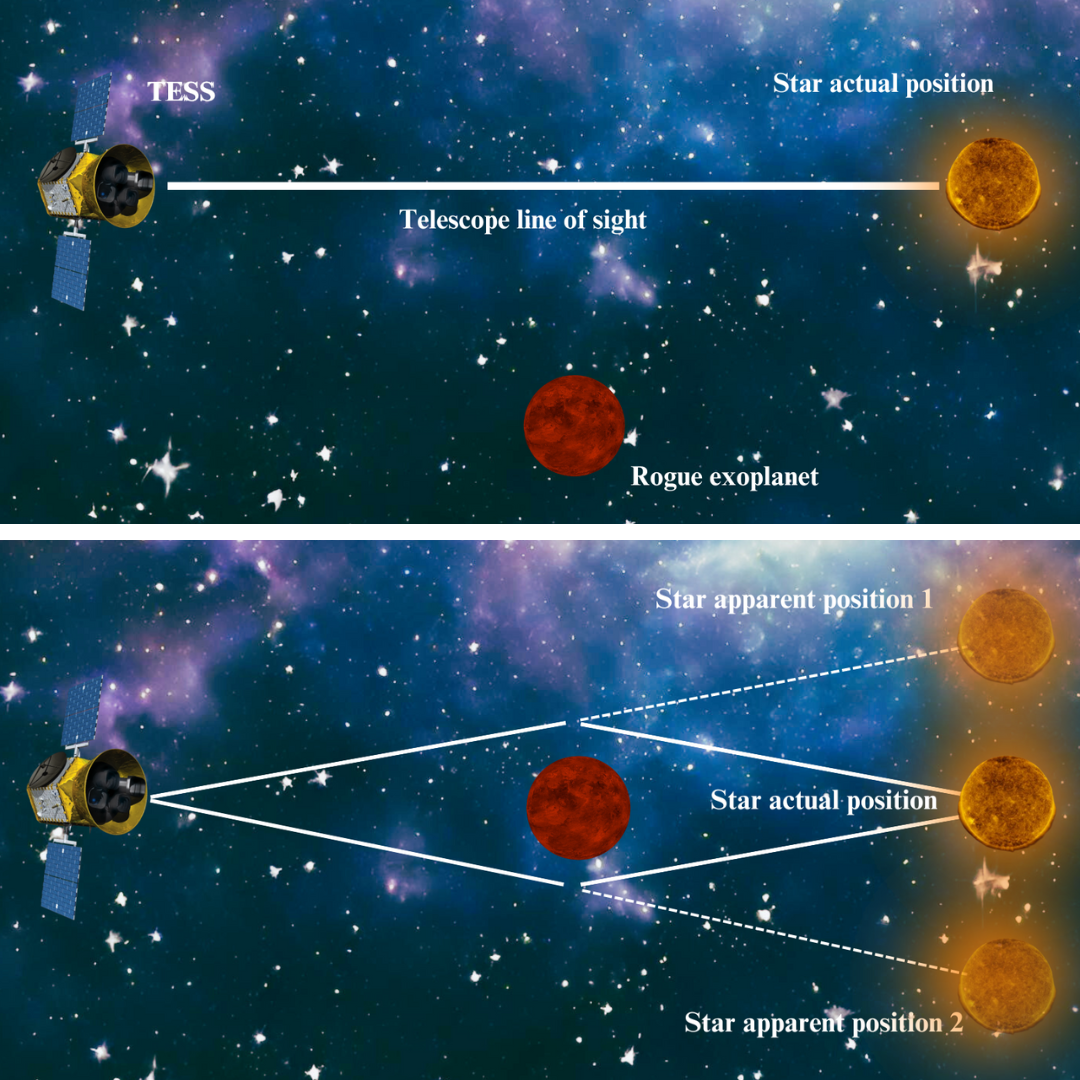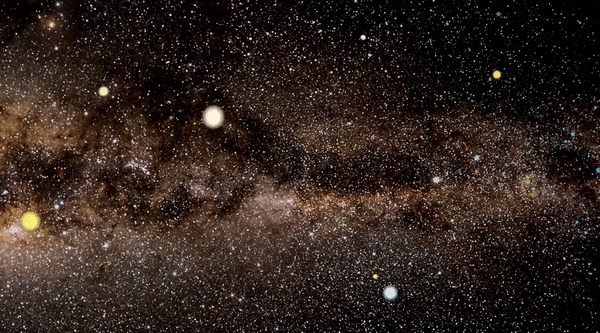NASA's TESS exoplanet hunter may have spotted its 1st rogue planet
NASA’s Transiting Exoplanet Survey Satellite (TESS) may have discovered its first free-floating, or “orphaned,” planet. That’s a planet roaming the cosmos without a star, all alone.
The potential discovery demonstrates that TESS can use a phenomenon first suggested by Albert Einstein over 100 years ago to spot these so-called rogue planets.
Despite the fact that we’re most familiar with planets that orbit a parent star (or stars) after discovering over 5,000 exoplanets that exist in such an arrangement, the Milky Way is estimated to be populated with a huge number of free-floating rogue planets, too.
In fact, our galaxy may contain as many as a quadrillion (10 followed by 14 zeroes) rogue planets that have been ejected from their home systems by gravitational interactions with other planets or passing stars. That means these free-floating worlds could vastly outnumber the amount of stars across the Milky Way. Thus, the potential detection of such a cosmic orphan by TESS, which launched in 2018, is a big deal.
“We discovered the first signal in TESS data that is consistent with what one would expect from microlensing by a free-floating planet,” team co-leader Michelle Kunimoto, a postdoctoral fellow specializing in exoplanet detection at the Massachusetts Institute of Technology (MIT), told Space.com.
“This was only the first sector we searched through of the 75 that TESS has observed, with each sector corresponding to around 27 days of TESS observations,” Kunimoto continued. “Finding something so early was surprising — but really exciting.”
Should this signal actually indicate a rogue exoplanet, the team tells Space.com, it would likely be a planet with a mass a few times that of Earth at a distance of no less than 6,500 light-years away.
A little “rogue hunting” help from Einstein
The majority of exoplanets that have been detected thus far have been hinted at thanks to the effect they have on their parent star. This could be a “wobble” in the star’s motion caused by an orbiting planet’s minor gravitational tug, or a drop in light that happens as an orbiting planet crosses, or “transits,” the face of its star.
Without a parent star, however, neither of these methods apply. That’s what makes detecting rogue planets so difficult.
“Rogue planets are dark, as you might expect, and they don’t orbit any stars, which means the usual techniques for detecting exoplanets don’t really work,” Kunimoto said.
Fortunately, Einstein’s 1915 theory of gravity, better known as general relativity, predicts a phenomenon that can be used to spot these free-floating exoplanets.
Einstein suggests that objects with mass curve the very fabric of space and time, or spacetime, with gravity arising from this curvature. When light passes one of those curved spots in spacetime, its path gets bent. That means light from a background source, say a star or a galaxy, can take different paths around the intervening “lensing” object, thus arriving to an observer’s vision at different times.
This phenomenon is called “gravitational lensing,” and results in the position of the background source shifting from the perspective of the observer, or appearing in multiple places in the same image.

A diagram showing how rogue planets passing between a distant star and the TESS exoplanet hunter can cause gravitational lensing that allows them to be detected. (Image credit: Robert Lea (created with Canva)/NASA)
Rogue planets have very little mass, so the lensing effect is weak and thus called “microlensing.” Yet, it can cause a brightening of a background source that is visible to astronomers, indicating the presence of a rogue planet.
“Microlensing is the best — and typically only — option for finding these dark, isolated objects since it only relies on the mass of a planet through its gravitational field,” Kunimoto said.

The gravity of a free-floating “rogue” planet may deflect and focus light from a distant star when passing closely in front of it. Owing to the distorted image, the star temporarily seems much brighter. (Image credit: J. Skowron/Warsaw University Observatory)
Forget the “T” in TESS
As the “T” for transit in TESS suggests, this space telescope may not immediately seem like the right instrument to hunt for rogue planets.
“TESS is designed to look for planets closely bound to their host stars by searching for transits,” Kunimoto explained. “Transits are the ‘dimmings’ of the star caused by a planet passing in front of it, like what you might have seen in the recent eclipse.”
However, as mentioned above, gravitational lensing can also cause a background star to brighten as a lensing object passes between that star and Earth. Kunimoto explained that, because TESS is sensitive to tiny changes in a star’s light, it can also detect these brightening episodes, a hallmark feature of microlensing caused by free-floating planetary rogues.
But, given this, you might wonder: Why is this the first potential rogue exoplanet among the other 6,000 or so exoplanet candidates (400 or so of which have been confirmed) TESS has spotted since 2018?
Well, it turns out no one was really looking until now.
“TESS is surprisingly well-suited to finding rogue planets through microlensing, but it turns out that these kinds of signals hadn’t really been explored previously in TESS data,” Kunimoto pointed out. “Our approach of looking for unbound planets with microlensing and the resulting TESS planetary microlensing candidate were both firsts for TESS.
“Since TESS data hadn’t been used to look for short-duration microlensing events before, past exoplanet searches weren’t going to be sensitive to seeing these signals.”

An illustration shows a cold orphan rogue planet covered in ice due to the lack of a parent star and lacking any light output of its own. (Image credit: NASA’s Goddard Space Flight Center)
Unfortunately, however, like with many other detected exoplanet candidates, this discovery still needs to be confirmed.
“It’s important to say that we can’t at present confirm this is a planet,” Kunimoto said. “The fact that microlensing events do not repeat means it’s difficult to discern the nature of any particular signal. So, we’re cautious about the origin of this event, naming it a rogue planet ‘candidate’ because it’s consistent with the signal you’d expect from such a world.”
She added that, as the team explores more TESS data and performs follow-up observations, the truth about the signal will slowly become clearer.
Still, the provisional nature of these findings certainly hasn’t dimmed the enthusiasm of the team or their excitement.
“Definitely a ten out of ten excitement from me,” William DeRocco, team co-leader and a researcher at the University of California Santa Cruz, told Space.com. “I’m used to looking for dark matter, where the odds of actually seeing anything are wildly low, so the potential of discovering something like a rogue world drifting in the darkness of interstellar space is just incredible.”
The authors of this research believe that the future is bright when it comes to the prospect of TESS discovering more rogue planets.
“This is proof of principle that TESS can find these kinds of signals, and now it’s up to us to start diving deep into finding more and understanding what they might mean,” Kunimoto concluded.”We’ve searched through less than 1% of TESS data; with 99% to go, we have a wealth of new opportunities for exciting discoveries along the way!
The team’s research has been submitted for publication in the journal Monthly Notices of the Royal Astronomical Society. It is currently featured as a pre-peer review paper on the repository site arXiv.
